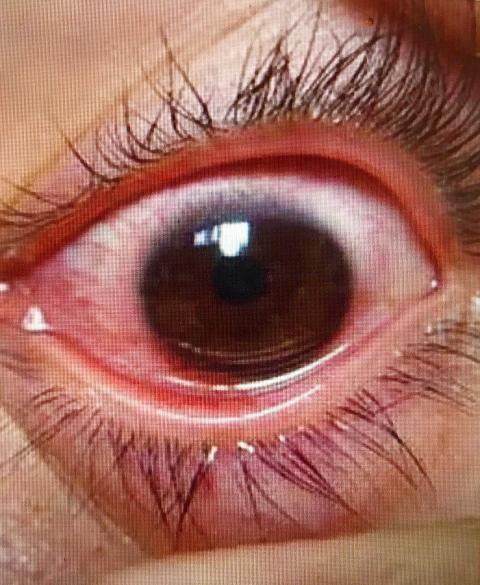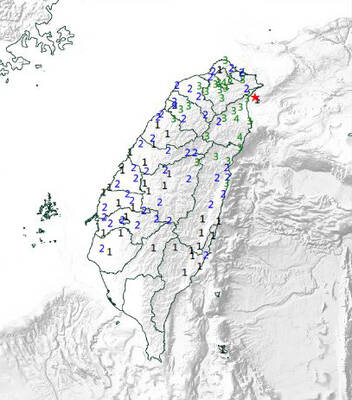An ophthalmologist on Monday warned people against using their smartphones for extended periods with screen brightness set to the highest level after a woman developed red eyes and experienced symptoms of corneal abrasion.
The 25-year-old woman, surnamed Chen (陳), in September last year sought medical help for red, teary eyes, as well as eye pain and floaters, said Hung Chi-ting (洪啟庭), an ophthalmologist at Fooyin University Hospital in Pingtung County.
An eye exam showed that her best corrected visual acuity was 0.5 and 0.6, he said.

Photo copied by Hung Chen-hung, Taipei Times
Chen said that her work as a secretary requires her to stay in touch with clients outside the office, and to see her smartphone’s screen clearly, she usually adjusted screen brightness to the highest level, or 625 lux, Hung said.
While this enabled her to see the messages on her smartphone in daylight, the combination of blue light emitted by the device and ultraviolet light from the sun bouncing off the screen increases the risk of developing cataracts and retinopathy, and could also lead to pink eye or corneal abrasion, he said.
Chen also did not lower the screen brightness after work and watched online shows on her smartphone with the lights turned off, he said.
Over time, this could result in severe inflammation of the cornea, conjunctivitis and floaters, Hung added.
Chen’s symptoms were relieved after three to four days of treatment using topical antibiotics and steroids, as well as artificial tears and other eye drops and creams, the ophthalmologist said.
To prevent similar cases, smartphone users should not keep screen brightness at the highest level all day, look at their smartphone’s screen under sunlight or view the screen in complete darkness, Hung said.
Computer and smartphone screens should be viewed from a distance of 30cm to 40cm, and the level of brightness should not exceed 500 lux, he said.

A 72-year-old man in Kaohsiung was sentenced to 40 days in jail after he was found having sex with a 67-year-old woman under a slide in a public park on Sunday afternoon. At 3pm on Sunday, a mother surnamed Liang (梁) was with her child at a neighborhood park when they found the man, surnamed Tsai (蔡), and woman, surnamed Huang (黃), underneath the slide. Liang took her child away from the scene, took photographs of the two and called the police, who arrived and arrested the couple. During questioning, Tsai told police that he had met Huang that day and offered to

LOOKING NORTH: The base would enhance the military’s awareness of activities in the Bashi Channel, which China Coast Guard ships have been frequenting, an expert said The Philippine Navy on Thursday last week inaugurated a forward operating base in the country’s northern most province of Batanes, which at 185km from Taiwan would be strategically important in a military conflict in the Taiwan Strait. The Philippine Daily Inquirer quoted Northern Luzon Command Commander Lieutenant General Fernyl Buca as saying that the base in Mahatao would bolster the country’s northern defenses and response capabilities. The base is also a response to the “irregular presence this month of armed” of China Coast Guard vessels frequenting the Bashi Channel in the Luzon Strait just south of Taiwan, the paper reported, citing a

BETTER SERVICE QUALITY: From Nov. 10, tickets with reserved seats would only be valid for the date, train and route specified on the ticket, THSRC said Starting on Nov. 10, high-speed rail passengers with reserved seats would be required to exchange their tickets to board an earlier train. Passengers with reserved seats on a specific train are currently allowed to board earlier trains on the same day and sit in non-reserved cars, but as this is happening increasingly often, and affecting quality of travel and ticket sales, Taiwan High-Speed Rail Corp (THSRC) announced that it would be canceling the policy on Nov. 10. It is one of several new measures launched by THSRC chairman Shih Che (史哲) to improve the quality of service, it said. The company also said

A magnitude 6 earthquake last night at 9:11pm struck off northeastern Yilan County, the Central Weather Administration (CWA) said. The earthquake’s epicenter was located in waters between Toucheng Township (頭城) and Turtle Island (Gueishan Island, 龜山島), about 22.1km northeast of Yilan County Hall at a depth of 112km, CWA data showed. There were no immediate reports of damage. The earthquake’s intensity, which gauges the actual effects of a temblor, was highest in Yilan’s Dongshan (冬山) and Nanao (南澳) townships and Taipei’s Xinyi District (信義), where it measured 4 on Taiwan’s seven-tier intensity scale. It measured 3 in other areas of Yilan and Taipei, as